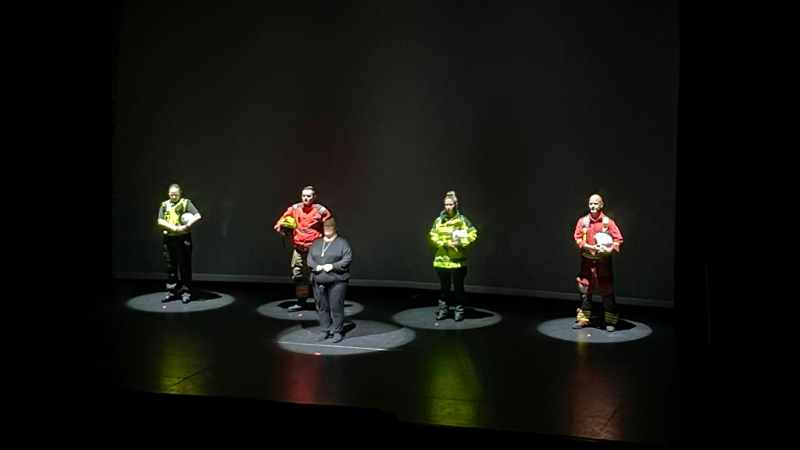
Each November, the SDSA initiative collaborators liaise with colleges across the North West with the purpose of inviting young people to the roadshow, which takes place in Greater Manchester. Annually, SDSA typically attracts over 8,000 students and, in almost 10 years since its inception, has educated over 50,000 young people.
At the event, speakers from Team NWAS, GM Police, GMFRS, and Northern Alliance NHS share powerful testimonies of road traffic collisions (RTCs) they have attended and talk about the realities for the patients involved. In addition, guests also hear from the relatives of loved ones who have sadly passed, as well as from the patients themselves who were involved in these horrific incidents.
Paramedic and HART Team leader Steven Blears who attends the events on behalf of NWAS says, “I started SDSA about eight years ago as a speaker and have taken part ever since. Working for our Hazardous, Area Response Team (HART), we were exposed to serious road traffic collisions, and it was my opportunity to try to change that through education.
“The ambulance service typically responds to the aftermath of an RTC. We are able to give a first-hand, unique perspective as we see the consequences of such incidents. I enjoy the ability to change attitudes and behaviours and after delivering SDSA, my driving always improves. The lessons and harrowing input from the family speakers make me think about my driving all the time.”
Young people between 16 and 25 greatly benefit from attending SDSA. Evidence gathered by the organisers shows this age group is most likely to cause accidents due to speeding, distraction, not wearing seatbelts, and driving under the influence.
In the last year alone, we were involved in over 10,000 RTC incidents. By being part of SDSA, we aren’t trying to convince people not to drive, but instead, we want to raise awareness of the risks caused by young people being behind the wheel.
When asked about some of the worst RTCs he’s been to, Steven says: “Incidents involving completely innocent road users or bystanders due to another person’s driving behaviour or choices. This could happen to anyone we know at any time, a genuinely scary thought.”
If you are going on a journey, take extra care and follow these ten simple tips that SDSA Greater Manchester have shared below:
- Always wear your seat belt and make sure your passenger belt up.
- The speed limit is not a target; use the right speed for the conditions.
- Always avoid being distracted; never use your phone when driving.
- Never drive after drinking or taking drugs, impaired driving wrecks lives.
- The road is not a racetrack; don’t fold to peer pressure.
- Choose a qualified driving instructor. Be comfortable and confident behind the wheel.
- Take time to learn the Highway Code. Don’t cram for your theory test.
- Choose the right car—nothing too fast and with a high safety rating.
- Learning does not stop after your driving test – every road is different.
- It’s your licence, your responsibility, and your life.
Visit https://safedrivegm.co.uk/ for more information on safe driving as well as any future events you can attend.
Take care this winter, and remember to visit 111.nhs.uk for non-urgent medical help and ring 999 for life-threatening emergencies or serious illnesses.